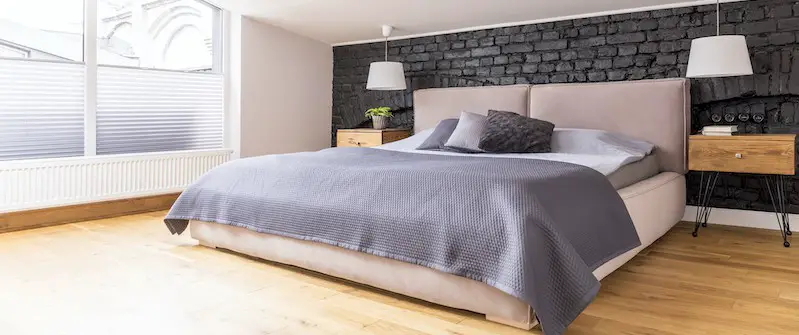Many pet owners share their beds with their furry friends. It's so sweet and adorable when they cuddle up close to you or rest their head on your feet while curling up at the foot of the bed.
And even if you're not letting your bed sleep in your bed, often you find they have done so in secret during the day while you were at work. And don't blame them; they miss you, and your bed has your familiar and secure scent all over it.
But if your pet sleeps in the same bed as you, it's ever so important to keep your bed clean and hygienic. See, most cats and dogs shed. And in addition to shedding hair and dander, they also drool, sweat, secrete body oils, and carry dirt in their paws and coat.
All that nasty stuff that gathers in your bed is lifted in the air you breathe when you toss and turn during the night.

One important factor that positively contributes to a good night's sleep is the clean air in the bedroom. And to achieve that, you need to keep your bed clean. Here is our guide to doing so:
[toc]
How to Keep Your Bedroom Clean –
6 Basic Steps
So, first of all, we need to start with the basics. What do you need to do to keep your bedroom clean? How often should you clean your bedroom? Let's find out.
[1.] Make your bed every morning
When your get up, you should let your bed air for about 5-10 minutes. This will allow all the moisture to evaporate before you make your bed.
Some people claim that there is no point in folding the bedding and covering it with a bedspread, but there are two important reasons for doing so.
Firstly, you're protecting your bedding from additional dust that would settle on the sheets during the day.
Secondly, you're ensuring that if your pet uses the bed for a nice long nap, all the pet hair stays on the cover and doesn't get into the sheets.
[2.] Change the sheets every week

Many people change their sheets only every second week. But if your pet sleeps in the same bed as you, we definitely recommend changing once a week to keep your linen fresh and clean.
[3.] Vacuum and mop once a week
Remember that it's not just the bed that needs to be kept clean. You'll need to vacuum and mop the floors once a week, too – and don't forget those dust bunnies under the bed.
Bedrooms collect a lot of dust, which, again, affects indoor air quality and has adverse effects on your sleep.
[4.] Dust above-floor surfaces once a week
Dust does not just gather on the floor; it settles on all above-floor surfaces as well. Once a week, you should get out a microfiber cleaning cloth or your handheld vacuum and dust all the surfaces that have dust built upon them. Otherwise, it will all get wafted into the air and settle onto your bed.
[5.] Wash the pillows, blankets, and comforters twice a year
In addition to weekly maintenance cleaning, you should also make sure you thoroughly clean your bedding at least twice a year.
Wash all your pillows, blankets, and comforters because although you're using sheets and pillowcases, some of that nasty stuff we mentioned earlier will penetrate the fabric and end up on the bedding.
[6.] Vacuum your mattress at least twice a year
You should carefully vacuum your mattress at least twice a year, sometimes even every month, if you suffer from allergies or asthma. After vacuuming, wash the cover if possible.
We recommend mattress covers for pet owners to protect their expensive mattresses from accidents. But if your mattress needs a more thorough cleaning, follow the instructions on the care label or have your mattress professionally cleaned when needed.
Now, these are the basics. By following these six steps, you will be making sure your bedroom stays clean and hygienic, helping you get a good night's sleep and wake up rested.
Next, we'll get into more details about keeping the bed itself clean.
How to Keep Your Bed Clean
You spend about 8 hours a day in your bed. That's one-third of your life! Many people focus on keeping their hallway, kitchen, and living area clean because that's what the guests would notice first.
But although it's important to keep all those areas tidy, you should also focus on your bedroom, and especially on your bed.

Letting your pet sleep in your bed has its pros and cons.
You may sleep better because the warmth and closeness make you feel safe and snug, but other experts claim your nights might be more restless as your pet moves around during the night. Shedding pet hair and dander is another problem. Even if you're not allergic, the air quality decreases, which may cause you to have a stuffy nose, itchy eyes, and a lower the quality of your sleep.
But, yes, we know. How could you resist not cuddling up with your best friend? Just remember that if you do, it's even more critical that you follow our guide to keep that bed clean.
Next, we'll talk about how to ensure your linen, bedding, and mattress stay hygienic.
How to Clean Bed Sheets
If your pet shares your bed, you should wash your sheets once a week. Buy sheets that are pet hair resistant so that all that pet hair slides easily of in the wash. Also, make sure your linen is machine washable (preferably in hot water) and that you can dry it in the dryer.
Check the care label first and use high temperatures whenever possible. Fabric softener may help if pet hair sticks to the fabric during the wash.
After washing, pop the sheets in the dryer. It will help remove even more pet hair, dander, dust, and other allergens.
Related reading: Pet Hair Resistant Bedding
How often should you change your bed sheets?
Most people change their sheets about every second week, but if your cat or dog sleeps in your bed, we recommend changing bed linen and duvet covers once a week.
The extra grime, including pet hair, dander, drool, and dirt, will build up faster and make your bed unhygienic quickly.
How to Clean your Blanket, Comforter, and Pillows
Your pillows and blanket or comforter are protected by sheets, duvet covers, and pillowcases. Still, they need to be washed periodically, as the dust, bodily oils, and other smut do penetrate the fabric and cause your bedding to become unhygienic as well.
For pet homes, we recommend buying bedding that can be washed in the washing machine. It will save you a ton of money as you don't have to have them professionally cleaned every few months.

A cotton or microfiber blanket can usually be washed in high temperatures and put in the dryer as well. Down comforters can sometimes be washed at home too. Still, you need your washing machine to be big enough, and line drying is usually not recommended. Hence, you need a big dryer too.
Another option is to choose a comforter with down alternative filling. They are hypoallergenic and easy to keep clean. Usually, they can be easily washed in the washing machine and then dried in the dryer to remove any remaining pet hair, fluff, lint, and dust.
Again, we recommend only buying products that are machine washable at home but also choosing smooth and silky fabrics that are pet hair resistant. Tightly woven cotton, linen, silk, or microfiber are excellent choices, while velvet, flannel, chenille, fur, and fleece will drive you nuts with how persistently pet hair tends to stick on them.
How often should you wash pillows, blankets, and comforters?
Pillows, blankets, and comforters should be washed at least twice a year. If you have allergies or you sweat heavily during the night, it might be a good idea to wash them up to 6 times a year.
Having hygienic and clean bedding is worth a little extra effort. It will help you sleep better and ensure the extra gunk brought into the sack by your canine or feline friend will be thoroughly removed every now and then.
How to Keep a Mattress Clean
This is a bit of a tricky question since there are so many different types of mattresses, and all manufacturers have specific instructions on how to care for their products. Since mattresses are expensive, you should always follow the manufacturer's advice carefully.
Still, it's a good thing to keep in mind that your mattress needs cleaning too. If you let your cat or dog sleep in your bed, we always recommend a waterproof mattress cover, which will protect your pricey mattress from possible urine, poo, or vomit accidents.
We also advise that it's wise to buy a mattress with a top layer with a detachable cover that can be washed in the washing machine. That way, it's easier to clean if an accident does happen.
The least you can do is vacuum your mattress twice a year. Do it thoroughly, and don't forget the creases, corners, and seams. Doing this will at least remove most of the dust that has built up.
Summing up – Keeping Your Bedroom Clean
The cleanliness of your bedroom is critical because it has an effect on your sleep quality. If you want to wake up rested and ensure your wellbeing, cleaning your bed is a good place to start.
Especially in pet homes, many pet owners allow their pets in the bed. It's adorable and can be comforting, but it just means that you have to be more meticulous about sticking to a cleaning routine in your bedroom.
However, by following the advice above, you will be able to share your bed with the furry family members while still ensuring the environment you sleep in stays clean, hygienic, and promotes your wellbeing.

